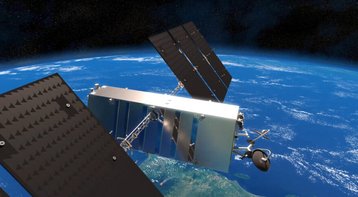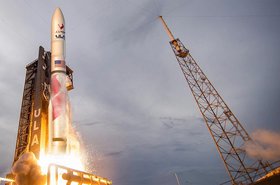Rapid commercial buildout in connectivity and communications infrastructure worldwide has been the bread and butter of the digital age, bringing record numbers online, connecting countless operations, and establishing an expansive foundation of data-based awareness across all industries.
One consequence of this has been a heavy reliance on private, monopolizing, and increasingly political Big Tech groups, leading to an uncomfortable relationship between the powers of oligarchs and foreign states, and data security.
At September’s DCD>Connect event in London, UK government representatives were in attendance to reaffirm Whitehall’s understanding of the importance of data infrastructure in Britain, and what industry needed for this to be delivered at scale, securely.
“Government engagement [with the private sector] has started to ramp up,” explained Ethan Thornton, the deputy director for data infrastructure security and resilience in the Department for Science, Innovation and Technology (DSIT). “There are things we know that they don’t, and certainly things they know that we don’t. Industry is going to have to trust us, even with proprietary content.”
The UK is not unique in its aspirations to expand and secure its data infrastructure from the ground up to orbit, especially when it comes to the most vital systems.
“Commercial space systems – such as imagery providers, RF systems, and communications systems – are providing more optionality for government use,” explains Nick Saunders, chief cybersecurity and data officer for government systems at satellite operator Viasat, which completed a $7.3 billion merger with Inmarsat in May 2023.
Defining sovereignty
Though the widespread privatization of connectivity technologies and companies in the last 40 years has fueled competition and growth across many sectors, it has also placed many essential services under the control of forces driven by the market, leading to uncertainty among certain national security bodies.
In July 2020, the UK government announced a total ban on the purchase of Huawei 5G technologies, adding that all Huawei equipment would be phased out of British 5G networks by the end of 2027 following a review from the National Cyber Security Centre. This was in response to similar sanctions imposed by the US government on Huawei, and more general growing distrust in Chinese technology across Nato member states.
Detailed reasons for the ban were outlined in an October 2022 Designation Notice, which stated “The Chinese state and its associated actors continue to seek to exploit weaknesses in telecommunications service equipment, and/or in how providers of public electronic communications networks build and operate their networks, in order to compromise their security.”
The report concluded that “dependency on Huawei significantly increases the potential impact of any systemic failures or hostile exploitation and therefore gives rise to unacceptable risks to national security.”
Are commercial networks truly secure? As Western countries take an increasingly hard line with China, communications technology providers, perhaps unsurprisingly, do not believe digital sovereignty is compromised by the commercial nature of their solutions.
“There’s nuance to sovereignty,” Glenn Katz, chief commercial officer at Telesat told DCD last year. His company’s Lightspeed Low Earth Orbit (LEO) network seeks to connect commercial, government, and defense markets worldwide, including for mission-critical and secure applications customers demand security guarantees about.
“Lightspeed has the capability to hand off full control of our satellites and network to a country,” he explains. “We’ve been having preliminary discussions with customers around the world interested in securing that application.”
Lightspeed was funded in part by the Canadian government, suggesting a state interest in the development of the solution for sovereign satellite assurance, though Katz insists the constellation could serve any allied government through the use of their own private gate station and full-mesh private network.
“We believe the target addressable market for government use of satellite is bigger than analysts believe because many of these global bodies haven’t yet recognized what they want and how it works,” Katz says. “But these discussions are happening today, and sovereignty is going to be a big priority.”
Viasat’s Saunders agrees. He says: “Many governments are planning to integrate sovereign satellite systems and commercial services to increase resilience with a hybrid communications architecture through which information can be sent across government and/or commercial satellites based on the mission need.”
“Securing the strategic value of space is increasingly becoming a must-have for power blocs,” Telesat’s Katz continues. “That’s what’s driving coverage of polar satellites. From our side of the fence, we see Nato taking this very seriously. We believe this market will one day become one of our bigger markets.”
But there’s another side to this story. Real sovereignty often means proprietary technology, which can come at the cost of interconnectivity with other systems.
“The idea that every space-faring country could have its own sovereign, global constellation to operate independently without any integration or interoperability to allow data/information exchange, is a hindrance to the operational capabilities that can and will need to be achieved by joint and allied forces,” Viasat’s Saunders argues.
Both Viasat and Telesat have been reliable developers of communications hardware and networks for the highest levels of US government branches as well as mission-critical procurers around the world.
The question of Starlink
Commercial operators launching more satellites more quickly than state-owned agencies and militaries have tested how comfortable governments are using privately-owned satellite capacity in times of conflict.
SpaceX’s Starlink has provided services to the Ukrainian army since 2022 to aid it in the fight against Russian invaders. This has enabled the use of connected drones for surveillance and strikes.
“Starlink is indeed the blood of our entire communication infrastructure now,” Mykhailo Fedorov, Ukraine’s digital minister, said in a 2023 interview with The New York Times.
Konstantin Sotnikov, manager of the regional operation division, Lifecell Ukraine, also highlighted Starlink’s impact in an interview with DCD last year.
“Starlink solutions allow us to restore the network quickly, especially in those areas where the transport network is seriously damaged and needs time to repair,” he said.
This is not without its problems. In September 2023, SpaceX’s founder, Elon Musk denied the service to Ukrainian forces for the purposes of an attack on Crimea, a territory that has been occupied by Russia since 2014 and that is likely to be hotly contested in any peace deal between the two countries. He said that he did so to avoid complicity in a “major act of war.”
Ukraine’s use of the technology has inspired attempts by Taiwan to develop its own service, for which it has been seeking financing for since early 2023.
“Our primary concern is facilitating societal resilience, to make sure, for example, that journalists can send videos to international viewers even during a large-scale disaster,” Audrey Tang, Taiwan’s digital minister told the Financial Times in January 2023.
A Wall Street Journal report claimed Musk and Russian President Vladimir Putin had been speaking regularly since 2022, which reportedly included Putin asking Musk for “a favor” on behalf of Chinese leader Xi Jinping not to activate Starlink services over Taiwan, restricting the nation’s options for satellite intelligence.
Kremlin spokesperson Dmitry Peskov denied that such regular conversations had taken place, but confirmed one telephone call on “space as well as current and future technologies,” had occurred.
Taipei has expressed an ambition to not “tie ourselves to any particular satellite provider,” but rather work with as many as possible to achieve better resilience.
Taiwan’s Taiwan Accelerator Plus (TAcc+) space accelerator program attended Paris Space Week 2024 earlier in 2024, seeking to invest in European aerospace technologies.
“By working more closely with expertise we can build something better together, and support Taiwan’s aspirations to become a more capable space nation,” Jessi Shen Jye Fu, project manager for TAcc+, told attendees.
Is a wave of space data nationalization ahead?
While not all tech companies are headed by erratic billionaires with authoritarian tendencies, the behavior of some has not reassured decision-makers in intelligence circles about private sector dependency.
Demand for sovereign mission-critical systems is on the rise globally.
In August 2024, UK Space Command launched a satellite, Tyche, from Vandenberg Space Force Base in California on a SpaceX Falcon 9. Built by Surrey Satellites Technology Limited (SSTL) and fully owned by the UK Ministry of Defence, the washing machine-sized satellite was financed as part of the 10- year ISTARI (Intelligence, Surveillance, Target Acquisition, and Reconnaissance) program, which has a £970 million ($1.2bn) budget.
At DCD>Connect, we asked DSIT’s Thornton about what the UK intends to do with its golden share in OneWeb, which survives the company’s $3.4 billion merger with Eutelsat.
“The government wouldn’t close routes of telecommunication before exploring them, so it’s a conversation that’s ongoing,” he explained.
Late last year, the Indonesian Ministry of Defence established a contract between a state-owned electromechanical giant PT Len Industri and Thales Alenia Space to develop a cutting-edge Earth observation constellation for an undisclosed sum.
The United States and China have been leading this trend for decades, but since the war in Ukraine, many more countries are realizing their interest in securing secure national connectivity.
The European Commission has experimented with pan-state solutions for problems like satellite assurance for years, with their Copernicus, Galileo, and Iris fleets, offering climate data, GPS, and aviation management, respectively.
These systems are financed by the combined purchasing power of the EU state, making use of developers that have become experienced with government contracting at this scale.
Iris is being delivered in partnership with Viasat, using their existing 14 geostationary satellites to manage the wealth of air traffic data that has already caused congestion at European airports across the continent.
But these trends may not be driven wholly by geopolitics.
“[Another important factor is] about countries wanting to exert more technical control and oversight with sovereign space capabilities,” Viasat’s Saunders argues.
The return of powerful nation-states and isolationist trade policies, epitomized by Donald Trump’s re-election in the US, means technological sovereignty is likely to remain a popular goal for many governments.
But achieving it will be an elaborate journey for nations that have pursued healthy and interconnected trading relationships for decades.
Read the orginal article: https://www.datacenterdynamics.com/en/analysis/the-quest-for-space-sovereignty/











